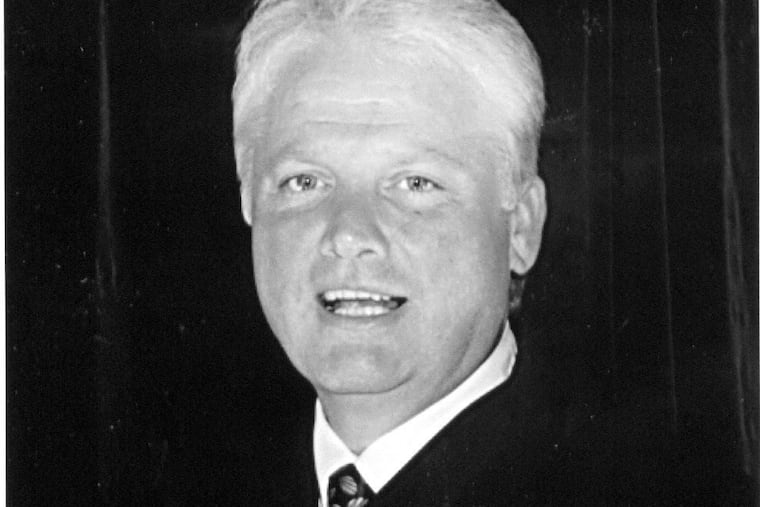A longtime Philadelphia judge won’t wear a mask in court, prompting complaints from lawyers and witnesses
The veteran judge has ordered others to remove their masks while in his courtroom, according to a written complaint obtained by The Inquirer.

Philadelphia Common Pleas Court Judge James Murray Lynn has repeatedly refused to wear a mask while sitting on the bench, despite pleas from prosecutors, defense lawyers, and witnesses who have expressed concerns about their health and safety.
And according to a written complaint obtained by The Inquirer, the veteran judge has ordered others to remove their masks while in his courtroom.
“It has come to the attention of our offices that Judge Lynn continues to refuse to wear a mask while operating in-person hearings,” wrote Alan J. Tauber, first assistant at the Defender Association of Philadelphia, in a letter dated Friday, to Margaret Murphy, administrative judge for the Family Division, where Lynn sits. “We believe this safety breach needs to be addressed expeditiously.”
“Not only was he not wearing a mask, but he was actively ordering counsel to remove their masks while litigating,” Tauber wrote on behalf of both public defenders and prosecutors in the District Attorney’s Office.
Lynn, 72, was first elected to the court in 1991, and won retention elections in 2001 and 2011, despite the Philadelphia Bar Association’s rating him “not recommended” both times. His term ends in 2021. Last year, the Philadelphia Coalition for Victim Advocacy presented an award to him for his “tireless work in Family Court on behalf of crime victims.”
Lynn did not return two messages left by a reporter Tuesday at his chambers.
Tensions over mask-wearing in Philadelphia courtrooms have increased in recent days as court and judicial administrators slowly and cautiously resumed some in-person proceedings after the coronavirus shuttered courts in March. Stakeholders are still debating how best to safeguard people during jury trials as the city’s COVID-19 infection rate decreases, but fears surrounding indoor activities remain.
In his letter to Murphy, Tauber noted that Lynn’s avoidance of masks runs “contrary” to a July 1 order from the state Department of Health that requires face coverings “in any indoor location where members of the public are generally permitted,” and is out of step with the First Judicial District’s own safety requirements. A sign indicating that masks are required is posted at the door leading into Lynn’s courtroom, Tauber wrote.
Some Criminal Court employees have been admonished for not wearing masks, prompting written reminders from supervisors that face coverings are a must, according to emails shared with The Inquirer.
“Please take time to announce at the start of every court session the need for participants to practice social distancing while in the courtroom and that masks must be worn at all times, unless a specific request is made to the court,” Supervising Judge Leon Tucker wrote in a July 29 email to Criminal Court judges.
Some courtrooms are already equipped with safety plastic glass, including a plastic box recently constructed around the bench in Lynn’s courtroom, 5F, where he routinely handles cases involving criminal abuse of children in Family Court at 15th and Arch Streets.
In response to questions from The Inquirer, Murphy’s spokesperson, Martin O’Rourke, said Lynn’s “presiding chair in his courtroom is positioned three feet behind a recently installed multisided plexiglass separation.”
O’Rourke added that lawyers and clients sit at least 15 feet away from Lynn and that Murphy has been in talks with lawyers with the defender’s and district attorney’s offices to resolve their concerns. O’Rourke said that Lynn asked one lawyer to “pull down his mask while he was talking” because he could not hear him.
And, O’Rourke said, the state Health Department order provides exceptions to wearing masks and permits judges to use their discretion during proceedings “where someone is required to speak (e.g., attorneys, witnesses, the judge) and to be heard intelligibly.”
Tauber’s letter to Murphy details six instances since July 29 in which Lynn refused or failed to wear a mask.
On Aug. 5, for example, Lynn held a preliminary hearing in a domestic violence case. Assistant District Attorney Liz Hines said she was ready to proceed with witnesses and asked Lynn if he planned to put on a mask. When Lynn said no, Hines left the courtroom to talk to the witnesses, who said they “did not feel comfortable coming into the courtroom to testify if the judge was not going to be wearing a mask,” according to Tauber’s letter.
Lawyers agreed to waive the preliminary hearing so witnesses did not have to testify before Lynn that day.
Hines and Tauber declined to comment.